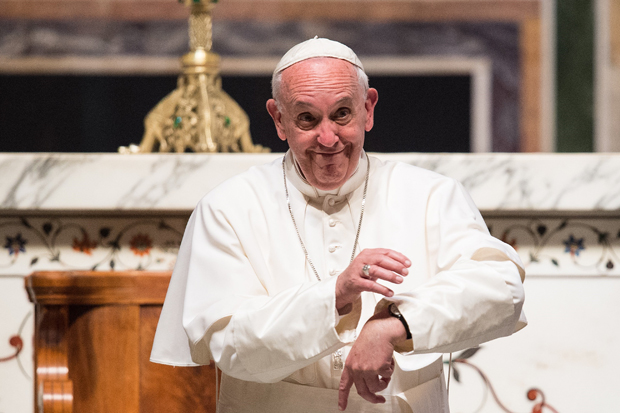On Tuesday, Pope Francis set foot in the United States for the first time in his life. His plane touched down at Andrews Air Force Base, Maryland, where American presidents depart and arrive on Air Force One. But, according to a Spanish journalist on the papal plane, this was not how Francis had wanted to arrive. He would have preferred to cross over from Tijuana, the grubby Mexican city menaced by drug gangs from which countless migrants slip across the border into California. In other words, if the report is true, the Pope wished to turn his arrival into a political gesture, aligning himself with America’s 11.3 million ‘undocumented’ immigrants and, implicitly but unmistakably, against the 77 per cent of US citizens who regard illegal immigration as a ‘serious problem’.
Such a stunt would have played badly with the American public. But it would have been portrayed sympathetically by the country’s liberal media, and greeted jubilantly abroad. Pope Francis has become the darling of the international left. Unlike his predecessor Pope Benedict XVI, who was usually caricatured as a reactionary, Francis can almost do no wrong. A group of left-wing activists planned to lead a rally in Washington’s National Mall during the Pope’s address to Congress on Thursday. The gathering was not, as one might have expected, to protest against the Catholic church’s teachings against same-sex marriage and abortion — teachings upheld by Francis. On the contrary, the rally was in support of the Pope’s ‘moral action on climate justice’.
The praise comes for his alarmist view of climate change taken in his encyclical ‘Laudato Si’, The same encyclical also argues that rich nations suck the wealth out of the ‘global south’ by stealing their natural resources — a crude theory which, not coincidentally, was popular among Latin American economists in the 1950s. It remains hugely popular in the developing world and broadly endorsed by left-wing opinion in Europe and America. Add to this the Pope’s hints that he favours relaxing the church’s rules banning divorced and remarried Catholics from receiving communion, and the assumption — based on little evidence — that he is tolerant of homosexuality, and it is small wonder that he has won so much applause in fashionable circles.
Francis’s appeal transcends politics, however. As Pope — much to the surprise of contemporaries who remember him as an austere figure — he has turned into an engaging chatterbox. He speaks with invigorating passion about Jesus, endlessly reminding Christians that they must turn away from self-indulgent pleasures. At the same time he has declared a ‘Year of Mercy’ in which his priests are encouraged to absolve penitents of the gravest sins. He conveys a personal moral authority independent of his office. This, combined with his reputation as a ‘superstar Pope’, gives him extraordinary influence over world opinion. His great success is emphasising the inherent generosity and tolerance of the Christian message.
Rather than using this influence to curry favour with environmental campaigners, however, the Pope should now use it to draw attention to matters that aren’t usually covered in the mainstream media. Francis warns of ‘doomsday’ if certain environmental policies are not adopted. Yet the Pope has not spent as much time pointing out the imminent reality of doomsday for Christians facing slaughter, abduction and slavery by Islamists in the Middle East. Take, for instance, the 70,000 Christians in Aleppo, Syria, currently surrounded by Isis fighters on three fronts. Their situation truly demands apocalyptic language.
The Pope has spoken of his ‘burning anxiety’ for persecuted Christians, and even suggested that ‘a form of genocide’ is taking place. Still, for him their plight appears to be a lower priority than an environmental crisis whose scale he may be exaggerating. His criticism of capitalism goes into a level of detail that, far from showing expertise, makes him appear naive. In contrast, he speaks in generalities about a tragedy that he could already have helped alleviate if he had forced his global audience to confront its stomach-churning reality.
Now, perhaps more than ever, when the Pope speaks, leaders and the global media will be listening. On Friday he will speak to the United Nations in New York. He should make a dramatic appeal on behalf of the Christians in what used to be called the Holy Land. He must take advantage of his popularity, not to generate more positive headlines about his own compassion, but to compel his unlikely fans to focus on a problem that they do not regard as ‘mainstream’ — meaning fashionable — but which is nonetheless crying out for action. The Pope’s popularity may not last. For Christians in the Middle East, time is running out, too.
Got something to add? Join the discussion and comment below.
Get 10 issues for just $10
Subscribe to The Spectator Australia today for the next 10 magazine issues, plus full online access, for just $10.
You might disagree with half of it, but you’ll enjoy reading all of it. Try your first month for free, then just $2 a week for the remainder of your first year.














Comments
Don't miss out
Join the conversation with other Spectator Australia readers. Subscribe to leave a comment.
SUBSCRIBEAlready a subscriber? Log in